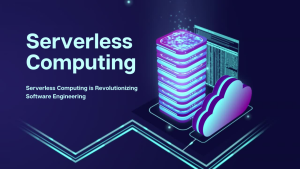Serverless computing, also known as Function as a Service (FaaS), is a cloud computing model where the cloud provider manages the infrastructure and automatically allocates resources to run individual functions or code snippets in response to events. In a traditional server-based architecture, developers need to manage and provision servers to run applications. However, in a serverless environment, developers can focus solely on writing code and leave the underlying infrastructure management to the cloud provider.
Key characteristics of serverless computing include:
- Event-Driven: Serverless functions are triggered by events such as HTTP requests, database changes, file uploads, timers, or other specific events. When an event occurs, the corresponding function is executed, and the cloud provider handles the scaling and provisioning of resources.
- Statelessness: Serverless functions are stateless, meaning they do not retain any memory of previous executions. Each function invocation is independent of others, making it easier to scale and manage.
- Auto-Scaling: Serverless platforms automatically scale up or down based on the incoming request volume. Functions are provisioned dynamically, ensuring optimal resource utilization and cost efficiency.
- Pay-as-You-Go Pricing: With serverless computing, users are charged based on the number of function executions and the time the function takes to run. There is no cost incurred for idle time, making it cost-effective for applications with sporadic or unpredictable workloads.
Benefits of Serverless Computing:
- Reduced Operational Overhead: Since server management is handled by the cloud provider,
developers can focus more on writing code and delivering value to users rather than dealing
with infrastructure concerns. - Scalability: Serverless platforms automatically scale the application to handle varying
workloads, ensuring that it can handle both high and low traffic periods efficiently. - Cost-Efficiency: Users only pay for the actual compute time and resources used during
function execution, resulting in cost savings, especially for applications with irregular or
infrequent usage. - Faster Time-to-Market: Developers can quickly deploy and iterate on serverless applications
due to simplified infrastructure management.
Use Cases for Serverless Computing:
- Web Applications: Serverless architectures are well-suited for building lightweight, event-
driven web applications that require automatic scaling to accommodate varying traffic loads. - Backend Services: Serverless can be used to build backend services, APIs, and microservices,
where individual functions handle specific tasks. - Real-time Data Processing: Serverless platforms are ideal for processing real-time data
streams, such as event processing, log analysis, and data transformation. - Automation and Orchestration: Serverless functions can automate repetitive tasks, schedule
jobs, and orchestrate workflows.
Popular Serverless Platforms:
- AWS Lambda (Amazon Web Services)
- Azure Functions (Microsoft Azure)
- Google Cloud Functions (Google Cloud Platform)
- IBM Cloud Functions (IBM Cloud)
- Vercel (formerly known as Zeit) for frontend-focused serverless deployments.
Serverless computing is gaining popularity due to its simplicity, cost-effectiveness, and scalability. It
allows developers to build and deploy applications without the burden of managing servers, making
it an attractive option for a wide range of use cases in the modern cloud-based software
development landscape.




